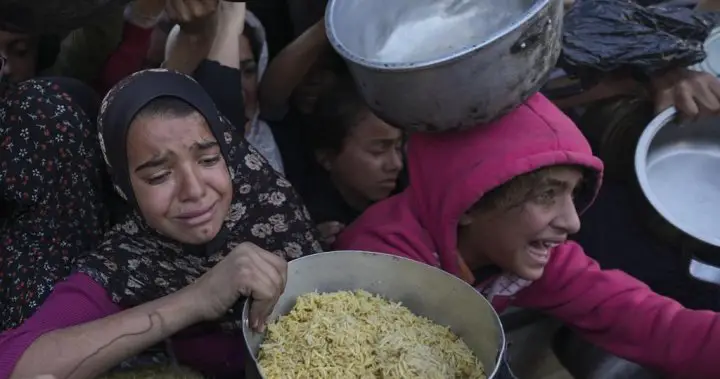A fourth child has died of hypothermia in the Gaza Strip, where hundreds of thousands of Palestinians displaced after nearly 15 months of war are crammed into tents on the rainy, windswept coast as winter sets in.
Jomaa al-Batran, 20 days old, was found with his head “ice cold” when his parents woke up on Sunday, his father Yehia said. The baby’s twin brother, Ali, was transferred to the intensive care unit at Al-Aqsa Martyrs Hospital.
Their father said the twins were born a month prematurely and spent only one day in the nursery at the hospital, which is like other health centers in the area Gaza is overwhelmed and only works partially.
He said doctors had told their mother to keep the newborns warm, but that was impossible because they lived in a tent and temperatures regularly fell below 10C at night.
“There are eight of us and we only have four blankets,” al-Batran said, cradling his son’s pale body. He described dewdrops seeping through the tent canvas overnight. “Look at its color because of the cold. See how frozen he is?”
Children, some barefoot, stood outside and watched him mourn. The infant, wrapped in a shroud, was placed at the feet of an Imam and was barely larger than his shoes. After the prayer, the Imam took off his ankle-length cloak and wrapped it around the father.
“I’m getting warm, my brother,” he said.
At least three more babies have died from the cold in recent weeks, according to local health officials.
A Palestinian woman is killed at home in the West Bank
A Palestinian woman was shot dead in her home in the restive West Bank city of Jenin, where the Palestinian Authority launched a rare campaign against militants this month.
The family of Shatha al-Sabbagh, a 22-year-old journalism student, said she was killed by a Palestinian security force sniper late Saturday while she was with her mother and two children. They said there were no militants in the area at that time.
A statement from the Palestinian security forces said she was shot by “outlaws” – the term they use for local militants fighting Israeli forces. Security forces condemned the shooting and vowed to investigate it.

The Western-backed Palestinian Authority exercises limited self-government in parts of the Israeli-occupied West Bank. She is unpopular among Palestinians, primarily because she cooperates with Israel on security issues, even though Israel accuses her of incitement and generally turns a blind eye to militancy.

Get national news daily
Receive the most important news as well as headlines from politics, business and current affairs in your inbox once a day.
In a statement, the al-Sabbagh family accused Palestinian security forces of having become “repressive tools that carry out terrorism against their own people instead of protecting their dignity and resisting the (Israeli) occupation.”
The Hamas militant group blamed security forces, noting that al-Sabbagh was the sister of one of its fighters who was killed in battle with Israeli troops last year.
Later on Sunday, hundreds of people demonstrated in Jenin in support of Palestinian security forces, organized by the Fatah party, which dominates the Palestinian Authority.
Violence has flared up again in the West Bank since the Hamas attack from Gaza sparked the war there on October 7, 2023. Israel conquered the West Bank as well as Gaza and East Jerusalem in the 1967 Middle East war. The Palestinians want all three areas for a future state.
Israeli report describes abuse of hostages held in Gaza
The Oct. 7 attack killed about 1,200 people, mostly civilians, and abducted about 250, including women, children and older adults. About 100 hostages are still in the Gaza Strip, and at least a third are believed to be dead.
Israel’s Health Ministry released a report late Saturday alleging widespread physical, psychological and sexual abuse of people detained in Gaza.
The report, based on the findings of doctors who treated some of the more than 100 hostages released as part of a ceasefire last year, said the prisoners – including children – “subjected to severe physical and sexual abuse such as beatings, isolation and deprivation of food, water, branding, hair removal and sexual assault.”
The findings, which will be sent to the United Nations, could increase pressure on Israeli Prime Minister Benjamin Netanyahu to agree to a ceasefire and the release of hostages with Hamas. Families of hostages and supporters have been holding mass demonstrations for months, and diplomats have reported recent progress in long-running indirect talks.
Seven people were killed in an attack on a hospital in Gaza City
An Israeli attack on an upper floor of the Wafa hospital in Gaza City on Sunday left at least seven people dead and several others injured, according to the Civil Defense, a first responder to the Hamas-led government. The Israeli military said it attacked a Hamas control center inside the building, which it said was no longer serving as a hospital.
And an attack near Nuseirat in central Gaza left eight people dead and more than 15 injured, according to officials at Al-Awda Hospital.
Meanwhile, the Israeli military said militants fired five projectiles from the northern Gaza Strip into Israel for the second time in two days, adding that two of them were intercepted and the rest likely struck in open areas. The municipality of Sderot said three people were slightly injured on their way to emergency shelters. Rockets from the northern Gaza Strip had been rare in recent months as the Israeli military stepped up operations there.
According to local health authorities, over 45,000 Palestinians have been killed in the Israeli offensive. They say women and children account for more than half of the deaths, but do not distinguish between militants and civilians in their count. Israel says it has killed over 17,000 militants without providing evidence.
Israel’s bombings and ground operations have displaced about 90 percent of Gaza’s 2.3 million residents, often multiple times. Large areas, including entire city districts, are in ruins and important infrastructure has been destroyed.
Israeli restrictions, fighting and the breakdown of law and order have hampered the delivery of humanitarian assistance and raised fears of famine, while starvation puts people at greater risk of illness and death.










